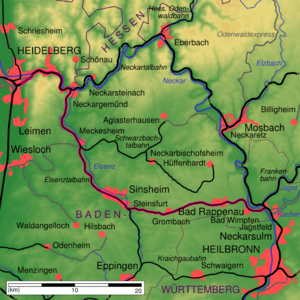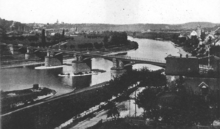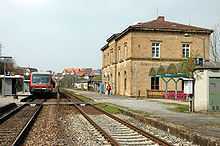Neckargemünd–Bad Friedrichshall-Jagstfeld railway
| Neckargemünd–Bad Friedrichshall-Jagstfeld railway | ||||||||||||||||||||||||||||||||||||||||||||||||||||||||||||||||||||||||||||||||||||||||||||||||||||||||||||||||||||||||||||||||||||||||||
|---|---|---|---|---|---|---|---|---|---|---|---|---|---|---|---|---|---|---|---|---|---|---|---|---|---|---|---|---|---|---|---|---|---|---|---|---|---|---|---|---|---|---|---|---|---|---|---|---|---|---|---|---|---|---|---|---|---|---|---|---|---|---|---|---|---|---|---|---|---|---|---|---|---|---|---|---|---|---|---|---|---|---|---|---|---|---|---|---|---|---|---|---|---|---|---|---|---|---|---|---|---|---|---|---|---|---|---|---|---|---|---|---|---|---|---|---|---|---|---|---|---|---|---|---|---|---|---|---|---|---|---|---|---|---|---|---|---|---|
 | ||||||||||||||||||||||||||||||||||||||||||||||||||||||||||||||||||||||||||||||||||||||||||||||||||||||||||||||||||||||||||||||||||||||||||
| Route number: | 706 | |||||||||||||||||||||||||||||||||||||||||||||||||||||||||||||||||||||||||||||||||||||||||||||||||||||||||||||||||||||||||||||||||||||||||
| Line number: | 4100 (Heidelberg Hbf–Karlstor) 4110 (Karlst.–Meckesh.–Neckarelz) 4114 (Meckesheim–Jagstfeld) | |||||||||||||||||||||||||||||||||||||||||||||||||||||||||||||||||||||||||||||||||||||||||||||||||||||||||||||||||||||||||||||||||||||||||
| Line length: | 58 km (36 mi) | |||||||||||||||||||||||||||||||||||||||||||||||||||||||||||||||||||||||||||||||||||||||||||||||||||||||||||||||||||||||||||||||||||||||||
| Track gauge: | 1,435 mm (4 ft 8 1⁄2 in) | |||||||||||||||||||||||||||||||||||||||||||||||||||||||||||||||||||||||||||||||||||||||||||||||||||||||||||||||||||||||||||||||||||||||||
| Voltage: | to Neckargem.: 15 kV, 16⅔ Hz AC | |||||||||||||||||||||||||||||||||||||||||||||||||||||||||||||||||||||||||||||||||||||||||||||||||||||||||||||||||||||||||||||||||||||||||
| Maximum incline: | 1.36 % | |||||||||||||||||||||||||||||||||||||||||||||||||||||||||||||||||||||||||||||||||||||||||||||||||||||||||||||||||||||||||||||||||||||||||
| Minimum radius: | 300 m (984 ft) | |||||||||||||||||||||||||||||||||||||||||||||||||||||||||||||||||||||||||||||||||||||||||||||||||||||||||||||||||||||||||||||||||||||||||
| State: | Baden-Württemberg | |||||||||||||||||||||||||||||||||||||||||||||||||||||||||||||||||||||||||||||||||||||||||||||||||||||||||||||||||||||||||||||||||||||||||
| Operating points and lines[1] | ||||||||||||||||||||||||||||||||||||||||||||||||||||||||||||||||||||||||||||||||||||||||||||||||||||||||||||||||||||||||||||||||||||||||||
Legend
| ||||||||||||||||||||||||||||||||||||||||||||||||||||||||||||||||||||||||||||||||||||||||||||||||||||||||||||||||||||||||||||||||||||||||||
The Neckargemünd–Bad Friedrichshall-Jagstfeld railway is an electrified, partly double-tracked main line in the German state of Baden-Württemberg, running from Heidelberg via Sinsheim to Bad Friedrichshall-Jagstfeld, that, for part of its course, follows the Elsenz river that gives it its name. The crossing stations on the single-tracked sections were controlled by mechanical signal boxes until 2008, but are now controlled by electronic interlockings.
The section from Heidelberg to Meckesheim was opened on 23 October 1862 by the Grand Duchy of Baden State Railway as part of the Odenwald Railway and is one of the oldest railways in Germany. The section from Meckesheim to Bad Rappenau was opened by the Baden State Railway on 25 June 1868 and it was extended to Bad Friedrichshall-Jagstfeld on 5 August 1869.
The line has been electrified to allow the extension of the Rhine-Neckar S-Bahn on the Heidelberg–Steinsfurt section of the line and to allow services of the proposed Heilbronn Stadtbahn on the section between Sinsheim and Bad Friedrichshall-Jagstfeld. In December 2009, services of line S 5 of the Rhine-Neckar S-Bahn were extended over the railway.
History


The section from Heidelberg to Meckesheim was opened on 23 October 1862 by the Grand Duchy of Baden State Railway as part of the Odenwald Railway, which was constructed to connect the Grand Duchy of Baden and Bavaria, bypassing the Kingdom of Württemberg and the Grand Duchy of Hesse. In 1864, Baden and Württemberg agreed to build three connections between the Odenwald Railway and Württemberg, including a line between Meckesheim, Bad Friedrichshall-Jagstfeld and Heilbronn. The section from Meckesheim to Bad Rappenau was opened by the Baden State Railway on 25 June 1868 and it was extended to Bad Friedrichshall-Jagstfeld on 5 August 1869.
The Regionalbahn connections between Mannheim, Speyer and Bruchsal were replaced in 2003 by the initial network of the Rhine-Neckar S-Bahn. In order to allow the S-Bahn to be extended on the Heidelberg–Steinsfurt section of the line and to allow the establishment of the northern section of the Heilbronn Stadtbahn between Sinsheim and Bad Friedrichshall-Jagstfeld, the entire track has been electrified. New stations were also established. In December 2009, services of line S 5 of the Rhine-Neckar S-Bahn were extended over the line.
Upgrade
The upgrade the infrastructure of the Elsenz Valley Railway and the Meckesheim–Neckarelz railway apart from electrification, which has now been completed, involves the construction or reconstruction of all platforms from Neckargemünd to establish a common height of 76 centimetres, which, along with other improvements to the platforms, was required to meet the standards of the Rhine–Neckar S-Bahn. Many stations have been modernised. New stations are planned at Bad Rappenau-Kurpark and Bad Wimpfen Ost. These will be served by the Heilbronn Stadtbahn. Installation of an electronic interlocking was completed in 2008 in parallel with the upgrade of the line.
Operations
The following services run on the line during the day:
- RE 2 (Regional-Express): Mannheim–Heidelberg–Meckenheim–Sinsheim–Heilbronn, running every two-hours
- RB 74 (Regionalbahn): Sinsheim–Steinsfurt–Bad Friedrichshall-Jagstfeld (–Heilbronn), running every two-hours
- S 5: Heidelberg–Meckenheim–Sinsheim–Steinsfurt–Eppingen, running hourly.
The S-Bahn services are operated using rolling stock consisting of class 425 electric multiple units. Line S 51 also operates on the Heidelberg–Meckenheim section hourly; this service continues from Meckenheim to Aglasterhausen. The overlapping services of lines S 5 and S 51 mean that the Heidelberg–Meckenheim section has a service at 30-minute intervals. In the peak hour additional S 51 services run between Meckenheim and Aglasterhausen to give a half-hour frequency.
The RE 2 services are also operated with class 425 sets.
Freight
Meckenheim freight yard was last served by freight trains on 31 December 2001, but up to 2009 wagons carrying timber were loaded on the Meckesheim–Neckarelz line and the Krebsbach Valley Railway and hauled to Mannheim twice weekly.[2] The upgrading of the line for the S-Bahn (which left only three tracks available in Meckenheim) and the closure of Krebsbach Valley Railway in 2009 ended this traffic. Freight trains run regularly from Heilbronn to the Solvay chemical plant in Bad Wimpfen.[3]
Through freight traffic does not normally use the line because the line is partly single-track and it is more hilly than the Neckar Valley Railway. In exceptional cases, freight trains with out-of-gauge loads that cannot use other routes gauge are routed on the Elsenz Valley Railway.
Notes
- ↑ Eisenbahnatlas Deutschland (German railway atlas) (2009/2010 edition ed.). Schweers + Wall. 2009. ISBN 978-3-89494-139-0.
- ↑ Der schienenbus (in German) (6): 79. 2005. Missing or empty
|title=(help) - ↑ "Freight timetable" (in German). cargonautus.de. Retrieved 6 January 2012.
References
- Hans-Wolfgang Scharf (2001). Eisenbahnen zwischen Neckar, Tauber und Main. Volume 1: Historische Entwicklung und Bahnbau (in German). Freiburg (Breisgau): EK-Verlag. ISBN 3-8825-5766-4.
- Hans-Wolfgang Scharf (2001). Eisenbahnen zwischen Neckar, Tauber und Main. Volume 2: Ausgestaltung, Betrieb und Maschinendienst (in German). Freiburg (Breisgau): EK-Verlag. ISBN 3-8825-5768-0.
External links
- 1944 timetable extract: S. 1, S. 2
- NVBW tourism marketing website; the Elsenz Valley Railway has number 706.
| Wikimedia Commons has media related to Elsenz Valley Railway. |